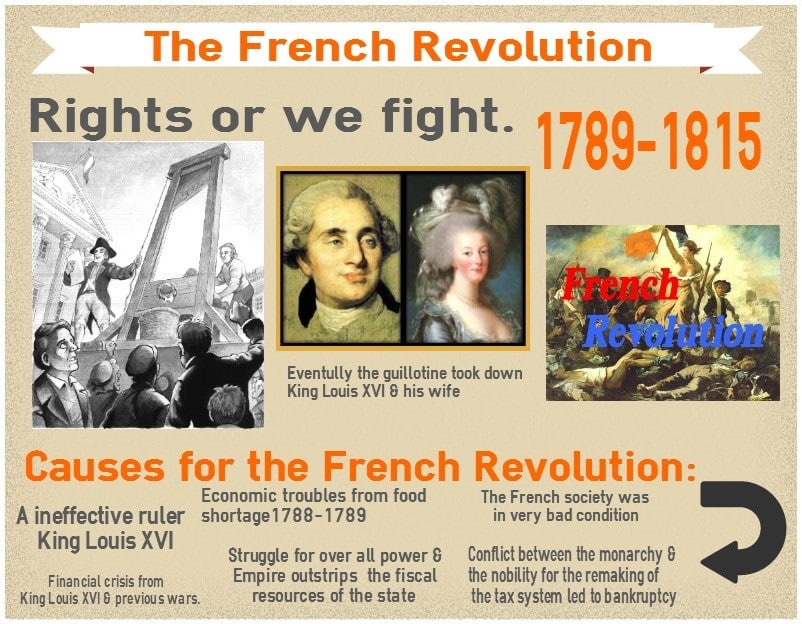The French Revolution was one of the most important events in world history. It began in 1789 and ended in 1799, changing France forever. It broke the power of kings, ended unfair privileges, and introduced powerful ideas like liberty, equality, and democracy.
Background: The Old System (Ancien Régime)
Before the revolution, France had a system called the Old Regime, where society was divided into three estates:
- First Estate – The Clergy (church leaders)
- Second Estate – The Nobles (rich and powerful families)
- Third Estate – Everyone else (farmers, workers, and the middle class)
The First and Second Estates paid almost no taxes and lived in luxury. The Third Estate (about 97% of the population) paid all the taxes and had the least rights. This created anger among common people.
Causes of the Revolution
1. Economic Problems
- France was in deep debt due to wars and royal spending.
- Prices of food, especially bread, became very high.
- The poor were starving while the rich enjoyed life.
2. Social Inequality
- The Third Estate had no voice in government.
- People were tired of injustice and unfair treatment.
3. Political Corruption
- King Louis XVI ruled alone with absolute power.
- There were no elections, no democracy, and no basic rights.
4. Ideas of Enlightenment
- Thinkers like Rousseau, Voltaire, and Montesquieu inspired people with ideas of freedom, equality, and human rights.
- People started asking: Why can’t we choose our leaders? Why should one person rule everyone?
The Start of the Revolution – 1789
Estates-General and the National Assembly
- The king called a meeting of the Estates-General to discuss taxes.
- The Third Estate was ignored, so they formed the National Assembly, claiming to represent the people of France.
Storming of the Bastille – July 14, 1789
- People attacked the Bastille prison, a symbol of royal cruelty.
- This is seen as the official start of the French Revolution and is celebrated in France as Bastille Day.
Key Changes and Reforms
1. End of Feudalism
- On August 4, 1789, nobles gave up their special rights.
- All people were declared equal by law.
2. Declaration of the Rights of Man and Citizen
- Passed on August 26, 1789.
- It said:
“All men are born free and equal.”
“People have rights to liberty, property, and security.”
“The government must serve the people.”
Fall of the Monarchy
1791 – Constitutional Monarchy
- France tried a middle way: keeping the king but limiting his power.
- But King Louis XVI tried to escape to Austria and was caught.
- People now saw the king as a traitor.
1792 – France Becomes a Republic
- The monarchy was ended.
- King Louis XVI was executed by guillotine in January 1793.
- Later, Queen Marie Antoinette was also executed.
The Reign of Terror (1793–1794)
Rise of Robespierre
- A radical leader named Maximilien Robespierre took power.
- His government killed anyone suspected of being against the revolution.
Mass Executions
- Over 16,000 people were executed during this period.
- Even innocent people lived in fear.
Fall of Robespierre
- In July 1794, Robespierre was arrested and executed.
- People wanted peace and a new start.
The Directory (1795–1799)
- A new government with five directors was formed.
- It was weak, corrupt, and couldn’t solve France’s problems.
- The country was still at war with other European nations.
- People were tired of instability.
Rise of Napoleon Bonaparte
1799 – Coup of 18 Brumaire
- A young general, Napoleon Bonaparte, took control of the government.
- He ended the revolution by forming the Consulate and later becoming Emperor.
Though the revolution ended, the ideas it introduced changed the world.
Impact of the French Revolution
Positive Outcomes
- End of monarchy and feudal privileges.
- Equality before law and new civil rights.
- Inspired revolutions in Europe, Latin America, and elsewhere.
- Spread ideas of liberty, democracy, and secularism.
Negative Sides
- Violence and fear during the Reign of Terror.
- Economic problems continued.
- Democracy ended when Napoleon became a dictator.
Slogans and Legacy
The famous slogan of the French Revolution was:
Liberty, Equality, Fraternity
These words continue to inspire people across the world to fight for justice and human rights.
Final Thoughts
The French Revolution showed that ordinary people can bring extraordinary change. They stood up against injustice, ended centuries of royal rule, and introduced modern values we cherish today – freedom, equality, and people’s power.
While the journey was not perfect, it taught the world that governments must serve the people – not rule them.
Share Your Thoughts
What do you think about the French Revolution?
Does it remind you of modern protests or movements?
Leave your comments below!
